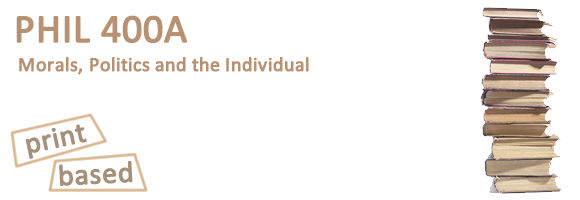
Mode of Delivery
This is a print-based, correspondence course.
Course Outline
- Four assignments
- Final examination
Course Description
Some influential philosophical writings and doctrines as an introduction to the problems and methods of philosophy. Credit may not be obtained for both Philosophy 100 and Philosophy 400A and 401A if taken by correspondence.
Every effort has been made to make the course both interesting and readily understandable. The texts have been selected with these aims in mind, and the course manual gives ample help with the readings. The essay questions have also been chosen with an eye to what students find intellectually exciting, and the manual provides advice on how to go about writing a philosophical essay. No previous contact with philosophy is presupposed: the course begins at the beginning and takes nothing for granted except a willingness to be exposed to the charms of philosophy.
Course Overview
Plato claimed that philosophy begins in wonder and ends in wisdom. It is arguable that Plato was overly-optimistic about where philosophy ends, but there can be no serious doubt that puzzlement is the authentic impulse to philosophize. The aim of this course is to introduce you to that impulse: to show how easy it is for puzzling philosophical questions to arise, to show how one can fruitfully explore such questions, and, we hope, to capture for you some of the intellectual excitement that can come from doing philosophy.
Course Content
The course is designed to give you a sampling of a range of philosophical problems. After an account of what philosophy is in Lesson One, and some basic logic in Lesson Two, we will go on, in Lessons Three and Four, to take up some questions in social and political philosophy. In Lesson Three, we will consider the question of whether we have any obligation to obey the law, and if we do, what the nature and source of that obligation is; in Lesson Four, we will tackle the question of the extent to which society can rightly interfere with the liberty of the individual. Lesson Five will give a taste of ethics. There we will consider an account of what makes actions right or wrong, and then go on to test that account for adequacy by seeing what judgements it yields on issues of practical ethics such as euthanasia, abortion, and famine relief.
You will be asked to do one logic assignment, three essays, and a final examination. Working at a reasonable pace, you should be able to complete the course in six to eight months.
Evaluation
Your final mark out of 100 will be based on the four lesson assignments and a final examination. The assignments will be worth 20 marks each for a total of 80, and the final exam will be worth 20 marks.
| Four assignments @ 20 marks each |
80 |
| Final Exam |
20
|
|
Total
|
100
|
Textbooks/Course Materials
- Plato. Euthrypho, Apology, Crito. Bobbs-Merrill, 1956.
- Singer, P. Practical Ethics. 2nd ed. Cambridge University Press, 1993.
- Wolff, R. P. In Defense of Anarchism. Univ. of California Press, 1998. 2nd ed.
- PHIL 400A Custom Course Materials. Excerpts from R.A. ed. Morality and the Law. Wadsworth, 1971.
- PHIL 400A Custom Course Materials. Distance Education Section.
- PHIL 400A Learner Package (includes course manual).
